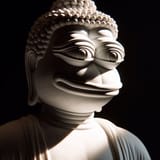Search Results
7/8/2025, 5:52:41 PM
>>17825327
Division is the disease of the modern materialist mind—a corrosive force that tears reality into lifeless fragments, each disconnected from the whole. This pathological mindset reduces existence to a soulless game of categories, measurements, and isolated objects, leaving behind a barren world where meaning evaporates and fulfillment is impossible. By continually dividing, we deny the interdependence that gives life its depth and richness. Instead, we construct a hollow framework of "self versus other," "mind versus body," "us versus them," creating endless conflict and alienation. The result? A desolate world of separation where everything, including the self, is meaningless.
Contrast this with the wisdom of oneness found in Eastern thought, which exposes the absurdity of division. In clinging to separation, the materialist mindset destroys the very foundation of existence—the interconnection of all things. Division leads not to understanding but to ignorance, as we fail to see the web of unity that binds life together. It is this unity that gives existence its fullness, its meaning, and its vitality. A divided world is not only empty but hostile, a playground for nihilism and despair. Embracing oneness is not just spiritual truth; it is the antidote to the sterile, joyless wasteland that materialism inevitably creates.
Division is the disease of the modern materialist mind—a corrosive force that tears reality into lifeless fragments, each disconnected from the whole. This pathological mindset reduces existence to a soulless game of categories, measurements, and isolated objects, leaving behind a barren world where meaning evaporates and fulfillment is impossible. By continually dividing, we deny the interdependence that gives life its depth and richness. Instead, we construct a hollow framework of "self versus other," "mind versus body," "us versus them," creating endless conflict and alienation. The result? A desolate world of separation where everything, including the self, is meaningless.
Contrast this with the wisdom of oneness found in Eastern thought, which exposes the absurdity of division. In clinging to separation, the materialist mindset destroys the very foundation of existence—the interconnection of all things. Division leads not to understanding but to ignorance, as we fail to see the web of unity that binds life together. It is this unity that gives existence its fullness, its meaning, and its vitality. A divided world is not only empty but hostile, a playground for nihilism and despair. Embracing oneness is not just spiritual truth; it is the antidote to the sterile, joyless wasteland that materialism inevitably creates.
7/5/2025, 7:24:35 AM
ID: uOTWwnTS/pol/509292428#509292428
7/2/2025, 11:09:06 AM
The philosophical legacy of ancient Greece provides a profound foundation that the West can build upon, particularly in understanding the nature of reality and human perception. Plato's Allegory of the Cave, with its powerful imagery of prisoners mistaking shadows for reality, offers a framework that resonates deeply with Eastern philosophical traditions. The cave dwellers, chained and fixated on flickering projections, represent humanity's tendency to mistake the transient and illusory for the permanent and real. This metaphor captures something universal about the human condition that transcends cultural boundaries and points toward timeless truths about consciousness and perception.
The Buddhist concept of samsara - the cycle of suffering driven by attachment to illusions - mirrors the predicament of Plato's cave prisoners with remarkable precision. Both traditions recognize that human suffering stems from our fundamental misunderstanding of reality's nature, whether we call it the world of shadows or the realm of impermanence and desire. The Buddhist teaching that craving and attachment bind us to endless cycles of dissatisfaction parallels the cave dwellers' inability to turn away from the mesmerizing but false images before them. By integrating these insights, Western thought can develop a more complete understanding of liberation - not merely as intellectual enlightenment but as a fundamental shift in how we relate to experience itself, moving beyond the compulsive grasping that keeps us trapped in our own versions of the cave.
The Buddhist concept of samsara - the cycle of suffering driven by attachment to illusions - mirrors the predicament of Plato's cave prisoners with remarkable precision. Both traditions recognize that human suffering stems from our fundamental misunderstanding of reality's nature, whether we call it the world of shadows or the realm of impermanence and desire. The Buddhist teaching that craving and attachment bind us to endless cycles of dissatisfaction parallels the cave dwellers' inability to turn away from the mesmerizing but false images before them. By integrating these insights, Western thought can develop a more complete understanding of liberation - not merely as intellectual enlightenment but as a fundamental shift in how we relate to experience itself, moving beyond the compulsive grasping that keeps us trapped in our own versions of the cave.
6/18/2025, 1:41:37 PM
6/16/2025, 6:27:32 AM
>>507554705
kek. given their current state i wouldn't be surprised if they end up targeting their own cities
kek. given their current state i wouldn't be surprised if they end up targeting their own cities
Page 1

